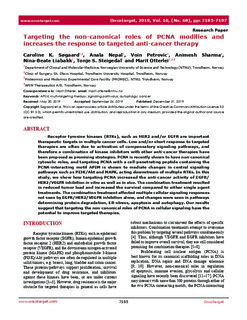| dc.contributor.author | Søgaard, Caroline Krogh | |
| dc.contributor.author | Nepal, Anala | |
| dc.contributor.author | Petrovic, Voin | |
| dc.contributor.author | Sharma, Animesh | |
| dc.contributor.author | Liabakk, Nina-Beate | |
| dc.contributor.author | Steigedal, Tonje S. | |
| dc.contributor.author | Otterlei, Marit | |
| dc.date.accessioned | 2020-01-22T10:46:32Z | |
| dc.date.available | 2020-01-22T10:46:32Z | |
| dc.date.created | 2020-01-20T10:47:54Z | |
| dc.date.issued | 2019 | |
| dc.identifier.citation | OncoTarget. 2019, 10 (68), 7185-7197. | nb_NO |
| dc.identifier.issn | 1949-2553 | |
| dc.identifier.uri | http://hdl.handle.net/11250/2637458 | |
| dc.description.abstract | Receptor tyrosine kinases (RTKs), such as HER2 and/or EGFR are important therapeutic targets in multiple cancer cells. Low and/or short response to targeted therapies are often due to activation of compensatory signaling pathways, and therefore a combination of kinase inhibitors with other anti-cancer therapies have been proposed as promising strategies. PCNA is recently shown to have non-canonical cytosolic roles, and targeting PCNA with a cell-penetrating peptide containing the PCNA-interacting motif APIM is shown to mediate changes in central signaling pathways such as PI3K/Akt and MAPK, acting downstream of multiple RTKs. In this study, we show how targeting PCNA increased the anti-cancer activity of EGFR/HER2/VEGFR inhibition in vitro as well as in vivo. The combination treatment resulted in reduced tumor load and increased the survival compared to either single agent treatments. The combination treatment affected multiple cellular signaling responses not seen by EGFR/HER2/VEGFR inhibition alone, and changes were seen in pathways determining protein degradation, ER-stress, apoptosis and autophagy. Our results suggest that targeting the non-canonical roles of PCNA in cellular signaling have the potential to improve targeted therapies. | nb_NO |
| dc.language.iso | eng | nb_NO |
| dc.publisher | OncoTarget | nb_NO |
| dc.rights | Navngivelse 4.0 Internasjonal | * |
| dc.rights.uri | http://creativecommons.org/licenses/by/4.0/deed.no | * |
| dc.title | Targeting the non-canonical roles of PCNA modifies and increases the response to targeted anti-cancer therapy | nb_NO |
| dc.type | Journal article | nb_NO |
| dc.description.version | publishedVersion | nb_NO |
| dc.source.pagenumber | 7185-7197 | nb_NO |
| dc.source.volume | 10 | nb_NO |
| dc.source.journal | OncoTarget | nb_NO |
| dc.source.issue | 68 | nb_NO |
| dc.identifier.doi | 10.18632/oncotarget.27267 | |
| dc.identifier.cristin | 1777348 | |
| dc.description.localcode | Open Access CC-BY | nb_NO |
| cristin.unitcode | 194,65,15,0 | |
| cristin.unitcode | 194,65,1,0 | |
| cristin.unitname | Institutt for klinisk og molekylær medisin | |
| cristin.unitname | MH fakultetsadministrasjon | |
| cristin.ispublished | true | |
| cristin.fulltext | original | |
| cristin.qualitycode | 0 | |

